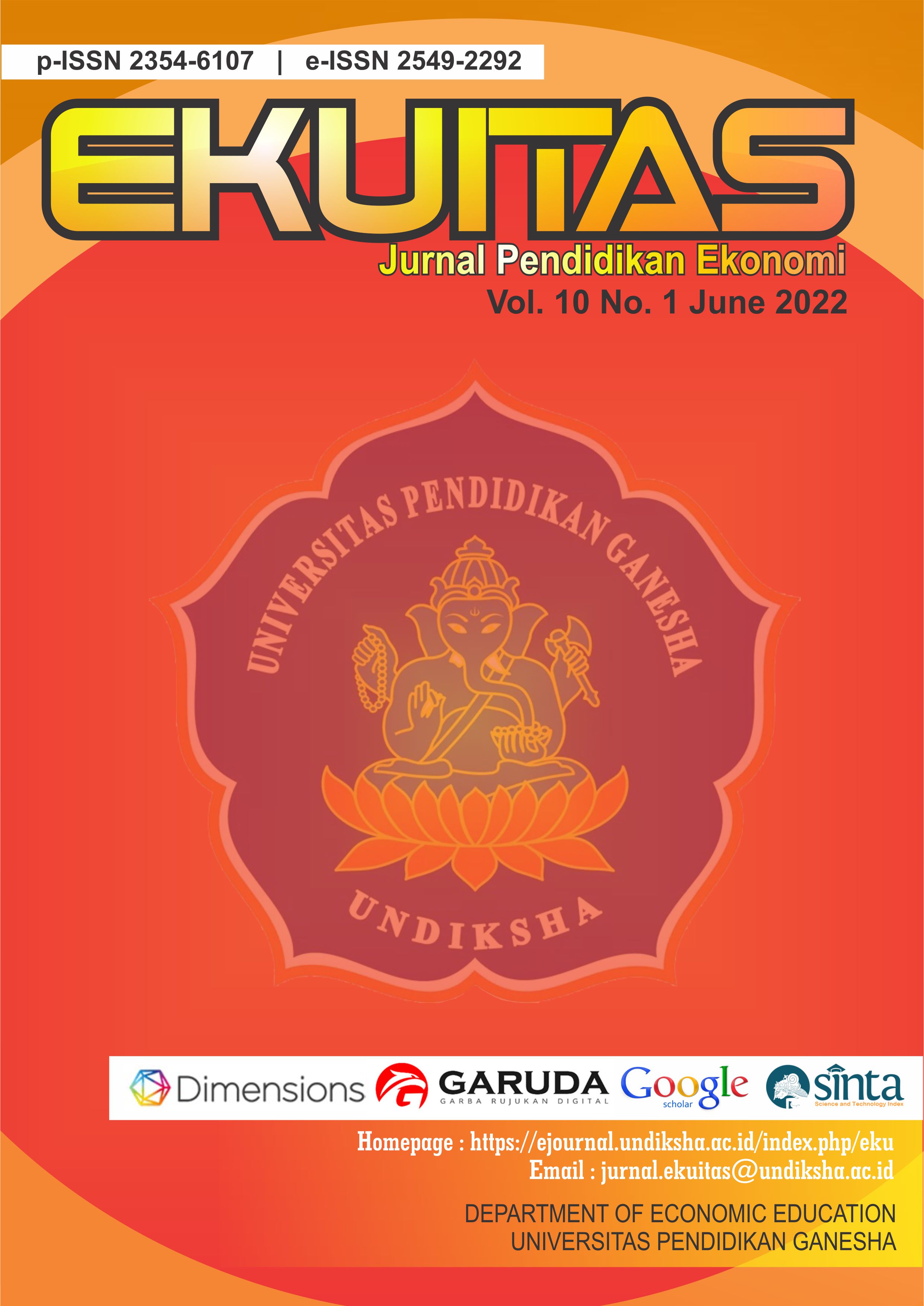Kognitif Pengelola Badan Layanan Umum dalam Mengelola Kekayaan di Perguruan Tinggi Keagamaan Islam Negeri
DOI:
https://doi.org/10.23887/ekuitas.v10i1.43806Kata Kunci:
Cognitive, leverage, manager, public service agency, PTKIN-BLUAbstrak
This study aims to analyze the knowledge (cognitive) of the Public Service Agency manager in managing university assets. This research was conducted at three State Islamic Religious Universities that have received the mandate of the Public Service Agency, including the State Islamic University of Sunan Ampel Surabaya, Sunan Kalijaga Yogyakarta, and Walisongo Semarang. Data collection was carried out using in-depth interviews with an unstructured approach. The key informants in the research were the chancellor, vice-rector and head of the general affairs bureau, and the head of the business unit. Data analysis used domain analysis and content analysis methods. The study results indicate that the knowledge of the Public Service Agency manager at the Islamic Religious College is still at the stage of applying the regulations on the Public Service Agency. There have not been many thoughts on the management of the Public Service Agency that analyze and evaluate the mandate of the Public Service Agency from the government. Moreover, creating or developing asset management owned. In general, the cognitive management of the Public Service Agency at Islamic Religious Universities is not total. This condition has an impact that is not optimal in managing assets as a source of non-academic higher education income.
Referensi
Anderson, D. (2013). An integrated system for Organizational transformation. Journal of Integral Theory and Practice, 8(1–2), 1–18.
Anderson, L. W., & Krathwohl, D. R. (2001). A Taxonomy for Learning, Teaching, and Assessing: A Revision of Bloom’s Taxonomy of Educational Objectives. New York: Longman.
Armstrong, P. (Center for T. (2009). Bloom’s Taxonomy Bloom’s Taxonomy. Center for Teaching, (1), 2–5.
Budi Waluyo. (2015). Analisis Permasalahan Pada Implementasi Pola Pengelolaan Keuangan Badan Layanan Umum. Jurnal Infoartha, 3(December 2014), 27–38.
Cambridge.Dictionary. (n.d.). Cognitive. In Dictionary.Cambridge.
Dit. PPK-BLU. (2020). Entrepreneurship pada Badan Layanan Umum. Direktorat Pembinaan Pengelolaan Keuangan BLU, Direktorat Jenderal Perbendaharaan.
Fatikha, A. C. (2016). Reinventing Government dan Pemberdayaan Aparatur Pemerintah Daerah. Jurnal Administrasi Pemerintahan Daerah, VIII, 90–97.
Fitzgerald, R. (2020). Endowment provides increased funding for U-M operations. University of Michigan.
Forehand, M. (n.d.). Bloom’s Taxonomy.
Gani, F. S. (2012). Implementasi Entrepreneur Government Dalam Birokrasi Pemerintah Daerah Kabupaten Gorontalo (Studi Di Kantor Pelayanan Terpadu Kabupaten Gorontalo) Ferdi S. Gani. Jurnal Ilmu Pelangi, 05(03), .
Harvard University. (2021). Financial report (fiscal rear 2021). In Harvard University. https://doi.org/10.1002/j.1556-6978.1971.tb01488.x
Huitt, W. (2011). Bloom et al.’s taxonomy of the cognitive domain. Educational Psychology Interactive.
Indrajit, R. E., & Djokopranoto, R. (2011). Wealth Management. Yogyakarta: Andi Offset.
Juliani, H. (2018). Eksistensi Badan Layanan Umum Sebagai Penyelenggara Pelayanan Publik. Administrative Law and Governance Journal, 1(2), 149–164. https://doi.org/10.14710/alj.v1i2.149-164
KBBI. (2016). Indonesia Dictionary. Education and Culture Ministry.
Kowarski, I. (2020, September). 10 universities with the biggest endowments. USNews.
Lasley, T. J. (2013). Bloom’s Taxonomy. Encyclopedia of Educational Reform and Dissent. https://doi.org/10.4135/9781412957403.n51
Lorsuwannarat, T. (2014). Autonomy and Performance of Agentification: Cases of Nine Independent Agencies in Thailand. Journal of US-China Public Administration, 11(10), 797–815. https://doi.org/https://doi.org/10.17265/1548-6591/2014.10.001
McGaha, K. K., & D’Urso, P. A. (2019). A non-traditional validation tool: using cultural domain analysis for interpretive phenomenology. International Journal of Social Research Methodology, 22(6), 585–598. https://doi.org/10.1080/13645579.2019.1621474
Merriam-Webster. (n.d.). paradigm.
Miotto, G., Del-Castillo-Feito, C., & Blanco-González, A. (2020). Reputation and legitimacy: Key factors for Higher Education Institutions’ sustained competitive advantage. Journal of Business Research, 112(November), 342–353. https://doi.org/10.1016/j.jbusres.2019.11.076
Nchukwe, F. F., & Adejuwon, K. D. (2014). Agencification of Public Service Delivery in Developing Societies: Experiences of Pakistan and Tanzania Agency Models. Africa’s Public Service Delivery and Performance Review, 2(3), 106. https://doi.org/10.4102/apsdpr.v2i3.61
Nunes-Silva, L., Malacarne, A., Macedo, R. F., & De-Bortoli, R. (2019). Generation of intangible assets in higher education institutions. Scientometrics, 121(2), 957–975. https://doi.org/10.1007/s11192-019-03226-5
Osborne, D., & Gaebler, T. (1996). Reinventing Government: How the Entrepreneurial Spirit is Transforming the Public Sector. Diterjemahkan oleh Abdul Rosyid, 1996. Memwirausahakan Birokrasi: Mentransformasikan Semangat Wisarausaha ke dalam Sektor Publik. Jakarta: Pustaka Binaman Pressido. (17th ed.; A. Rasyid, Ed.). Pustaka Binaman Pressindo.
Peraturan Menteri Keuangan. , Pub. L. No. Nomor 129/Pmk.05/2020 tentang Pedoman Pengelolaan Badan Layanan Umum (2020). Indonesia: Kementerian Keuangan.
Pudjiati, S. R. ., & Masykouri, A. (2011). Mengasah Kecerdasan di Usia 0-2 Tahun. Jakarta: Direktorat Jenderal Pendidikan Anak Usia Dini dan Pendidikan Masyarakat: Direktorat Pembinaan Pendidikan Keluarga,.
Sedarmayanti. (2001). Sumber Daya Manusia dan Produktivitas Kerja. Jakarta: CV. Mandar Maju.
Slamet, & Esha, I. M. (2020). Kinerja Perguruan Keagamaan Tinggi Islam Negeri Badan Layanan Umum Di Indonesia: Perspektif Balanced-Scorecard. Malang.
Slamet, Mustolik, I. B., & Hidayatullah, A. D. (2021). Wealt Management (Konsep dan Model Pengembangan Perguruan Tinggi Badan Layanan Umum). Malang: Inara Publisher.
Utari, R. (n.d.). Taksonomi Bloom, Apa dan Bagaimana Menggunakannya?
Wikipedia. (n.d.). Cognition. In Wikipedia, the free encyclopedia.
Unduhan
Diterbitkan
Terbitan
Bagian
Lisensi
Hak Cipta (c) 2022 Ekuitas: Jurnal Pendidikan Ekonomi

Artikel ini berlisensiCreative Commons Attribution-ShareAlike 4.0 International License.








